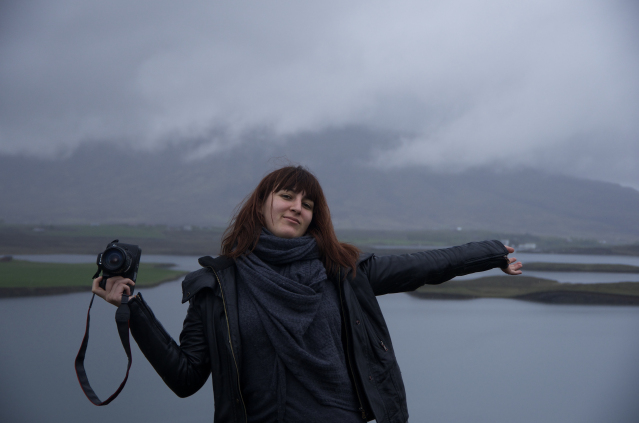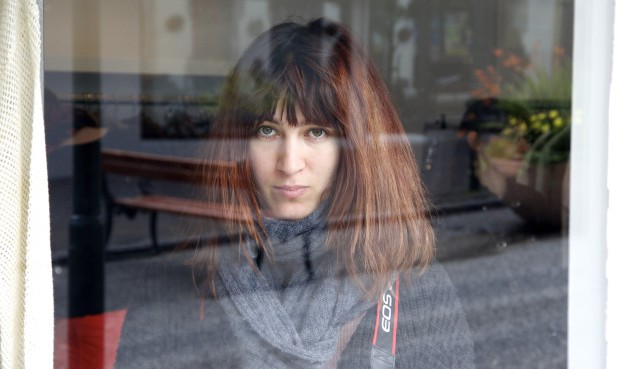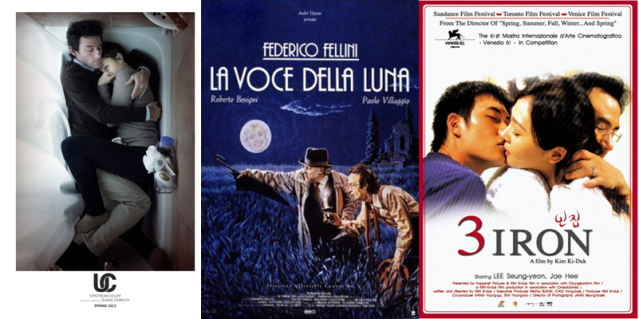By Daria Landal
Our next entry in FilmDoo’s campaign for Female Directors is Eleonora Mignoli, an Italian filmmaker working around the world and pursuing her dream of directing sci-fi films. Read her interview with us below!
One of the younger generation of female directors, Italian-born Eleonora Mignoli is optimistic about the future of women in cinema.
“The gap between what you want to do and how much money you actually have for it is changing. You can do more for less. So female directors will definitely find their own niche in the independent cinema, even if big studios are reluctant to commission them”.
Mignoli, who directed two shorts, Everything Is Made of Colour and The Carer, and a music video “Merry Go Round” for the British band Hana B, is also aiming at making her first feature film next year.
But Mignoli, who, besides being a director, is also an illustrator and writer, is a very busy bee already.
She is set to direct a short sci-fi film The Eternal Guardian this fall, pitching it to the Creative England program iShorts; the film will center on a story of a mother who tries to save her daughter from her destiny after humanity has escaped a dying earth. In addition, she is doing a documentary Mahosadha JÄtaka for Cambridge Shorts, telling the story of one of Buddha’s past lives, where he has to prove which end of the stick is top and which is bottom.
Mignoli points out that filmmaking led to her making many very interesting discoveries. For instance, while scouting filming locations for the sci-fi short, she learned that there is only one desert in England, and even that it is “more of a beach than a desert, anyway.” [Dungeness desert, largely formed of a shingle beach – editor’s note.].
On a more serious note, “You learn pretty soon in this industry that you have to put your ego out of the window,” says Mignoli. “For big bosses, the result is what matters. They want the utmost professionalism from any filmmaker, [male or female]. You could even be an alien for all they care.”
Story-telling has been dear to her heart ever since childhood, Mignoli recalls. She would tell herself stories in the evening before falling asleep, and she would pick up at the point where she stopped the following evening. It took her “quite some time” to accept that she wanted to tell her stories in a visual way, before some of her loved ones encouraged her to take a challenge of becoming a film director.
Mignoli, who has worked as a director in both the British and Australian film market, notes a huge gap between the two. “In Australia, you have access to a very high-level filmmaking and big studios right from the start, but at the same time, when you pitch a movie, you are often told to make a movie precisely for Australian audience. Many hit their professional ceiling fast, then move on to filmmaking elsewhere.”

She notes that she had always wanted to move to the UK, which she did last year: partly for personal reasons, being nearer her native country and her family, and partly for creative freedom this country could offer.
“There must be more filmmakers in London alone than in all of Australia,” Mignoli says.
There is one thing both countries have in common, however. “For a long time now, [movie industry] has been a man’s world, so most of the studio executives, producers and distributors are male. And they are going to choose male-oriented projects, because they appeal more to them.”
So far, Mignoli is not too disheartened about the industry treatment of women aspiring to be directors, approaching this with humour. She finds it funny during the studio pitches when the [male] producers keep looking at male applicants in the room even when asking her a question. “I’m sure they do it unconsciously” Mignoli giggles. “I’m always on the verge of bursting out with, ‘He doesn’t know the answer to that – I do!’ “
She maintains there are indications that the industry might change for the better – most notably, due to a new generation of filmmakers and moviegoers. “From my own experience, young males today are not biased. Even when I was in the process of directing, I did not feel at all any disrespect from male members of my crew or hear anything like “˜She doesn’t know what she is doing.’
Out of many challenges a female newcomer faces in the industry, Mignoli names “being bossy and determined, always demanding the best from your crew” as the biggest one, pointing out that this kind of attitude is encouraged in male filmmakers, but can clash with a traditional female upbringing where women are raised to be “likeable”.
This is not the only personality challenge female filmmakers undergo in the industry, Mignoli adds. Female directors often have to find something in themselves to persuade fellow female filmmakers, producers and studio executives that they are as worthy as men.
“If there are two men vying for presidency, they will go the distance together, then fight at the top. If there are two women, they will be fighting all along,” says Mignoli, adding that female directors tend to be extremely competitive towards fellow female directors rather than compete against male filmmakers, too.
“In my career, some female filmmakers in the crew could barely tolerate me, because they thought I was trying to get on top of them, which wasn’t the case at all. But sometimes, there is that covert competition in a team to become an alpha-female,” Mignoli says.
In addition to directing films, Mignoli is considering expanding her career as a music video director. Some of the today’s most prominent male directors, such as Marc Webb and David Fincher, were making music videos before embarking on a motion picture director career. This well be a good option for women, too, Mignoli suggests.
“Making music videos is different from making short films, but at the same time it gives a lot of opportunities to express your creativity,” says Mignoli. “It’s actually much easier to get the money to make a music video than a short film. It’s indeed a very viable way to [break into the industry] if you have a portfolio of music videos.”
For the time being, Mignoli says she is prepared to the hazards of the film industry, and is willing to wait up to ten years, when she would be able to support herself solely by making films.
“Making a movie, even a small one, takes up two to three years. I am going to continue directing, writing scripts and making short movies whenever I can. I’ll keep working in the industry, and hopefully, my luck will find me.”
Eleonora Mignoli Top 3 Film Recommendations
Upstream Color, 2013 (US). Dir. by Shane Carruth.
The Voice of the Moon, 1990 (Italy). Dir. by Federico Fellini.
3-Iron, 2004 (South Korea/Japan). Dir. by Ki-duk Kim.
Eleonora Mignoli’s personal website: http://eleonoramignoli.com







Reblogged this on Eleonora Mignoli and commented:
Film discovery platform FilmDoo is running a campaign for Female Directors. I happened to be lucky enough to be chosen by them, so here’s is it.. And scroll down to the end for my TOP 3 film recommendations!